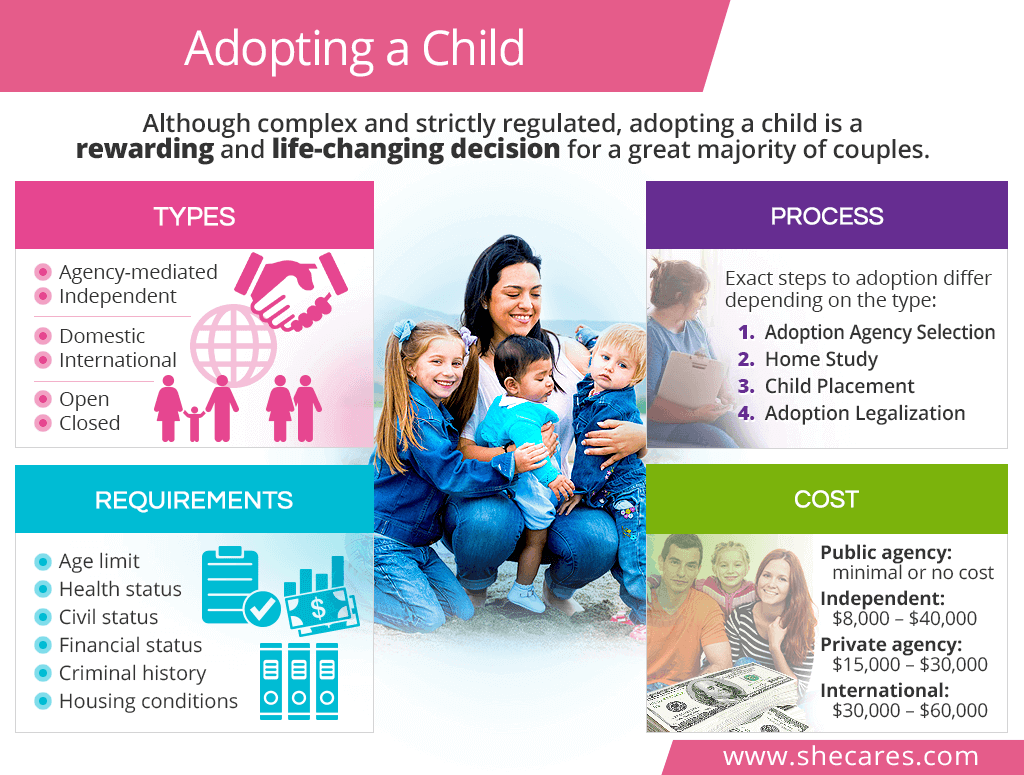Types of Adoption
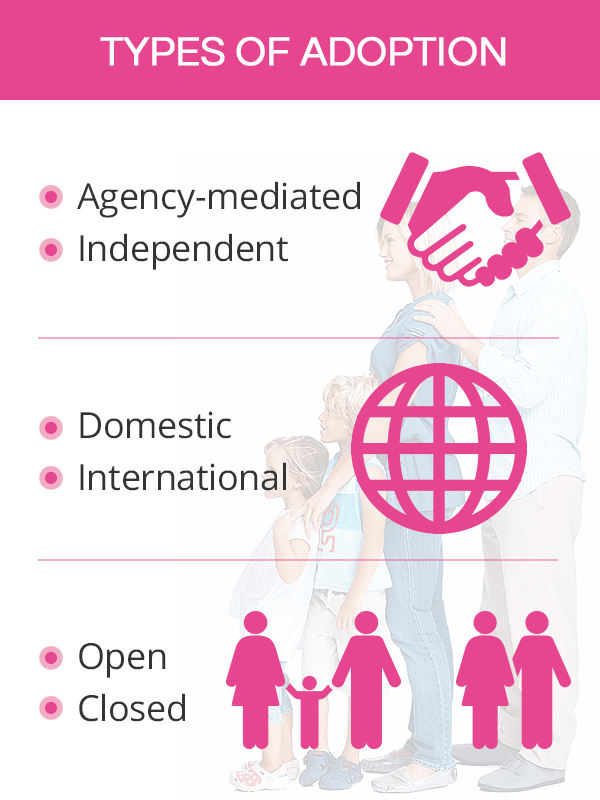
There are many different types of adoption, depending on one's point of focus, including who overlooks the adoption process, where adoption takes place, or what is the nature of contact with the biological parents.
Who Overlooks the Adoption Process
Adoption Agency. It is a legally authorized entity that handles the entire adoption process. Public child welfare agencies handle adoptions from foster care, while private agencies make arrangements with adoptive parents and biological parents considering putting their child up for adoption.
Independent Adoption. As the name suggests, an independent adoption is conducted without the adoption agency. Because of strict adoption laws, independent adoption is not allowed in many US states and countries.
Identified Adoption. Also called a designated adoption, this type combines an agency and independent types of adoption. In consists of adoptive parents making arrangements with the biological family with the help of an adoption agency or attorney, who will carry on the rest of the legal process.
Where Does Adoption Take Place
Domestic Adoption. It simply consists of adopting a child in the country of their birth by the adoptive parents from that same country.
International Adoption. It involves adopting a child from a different country than that of the adoptive parents. Countries like China, Ukraine, or India are the most popular destinations for international adoption.
Relationship with Biological Parents
Open Adoption. Both biological and adoptive parents know each other and make agreements regarding the nature and frequency of contact and engagements in each other's lives.
Close Adoption. A type of adoption where information about biological parents is not shared with the adoptive family, and vice versa.
Semi-open. The nature of contact, often mediated by an adoption agency, depends on specific arrangements between both parties and might include occasional updates from the adoptive family to the biological parents.
Adoption Process
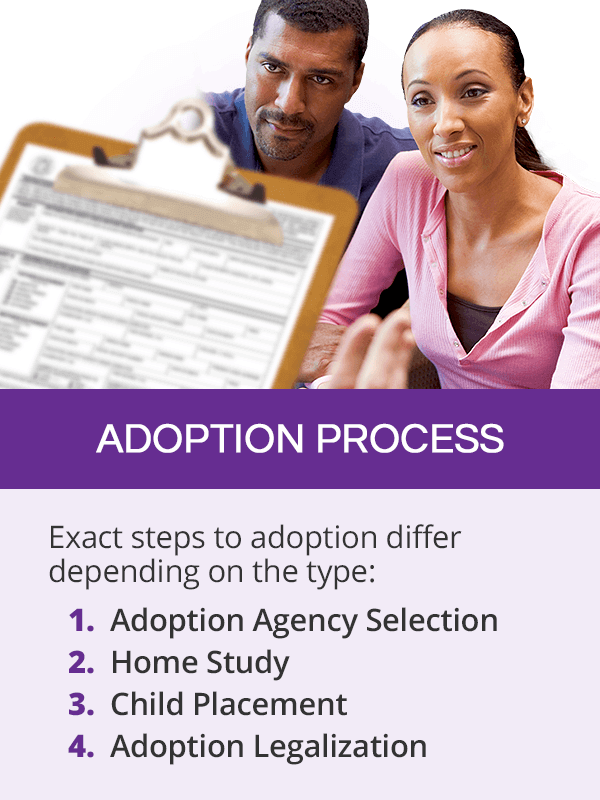
Specific steps to adopting a child will heavily depend on the type of adoption being pursued. Because agency adoptions are the most popular type, the following breakdown is specific to this type.
Adoption Agency Selection. Dedicating time to researching agencies can make a world of difference in terms of the duration of the process, financial input, and overall experience.
Home Study. It is the screening of prospective adoptive parents and their living conditions to ensure they are fit to adopt a baby. This process might take two to 10 months.
Child Placement. This step involves choosing the child a couple will adopt. Most commonly, the agencies offer a number of ways through which adoptive parents can get to know the children awaiting adoption.
Adoption Legalization. Once a child has lived with the adoptive family for several months, and the social worker has ensured his or her well-being, the adoption process can be finalized in court.
Although domestic adoptions can take from six months to two years, those pursued internationally might have a much longer waiting time of six to seven years as legal adoption requirements have to be fulfilled for both countries. All agencies offer post-adoption services, including counseling for both the parents and children.
Adoption Requirements
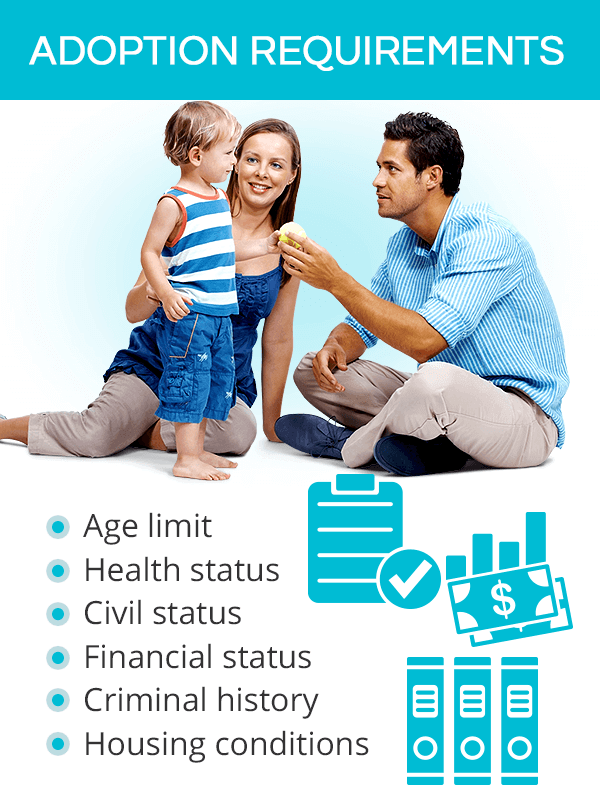
The adoption process is complex mainly because of an extensive set of legal requirements that are meant to ensure the child's well-being. The most important qualifications for adoption that are verified during the home study step include the following:
- Age limit. Although many US states do have an adoption age limit, some require adoptive parents to be at least 21 or 25 years old. Others require the parents to be 10-15 years older than the adopted child.
- Health status. Adoptive parents are required to be of good health, which includes physical and psychological well-being. Any chronic conditions or unresolved mental health issues should be promptly addressed.
- Civil status. Some US states will only allow couples who have been married for at least 2-3 years to adopt a baby. Others might exclude single parents or same-sex couples from adopting a child.
- Financial status. Although there are no specific financial requirements for adopting a child, a couple's finances will be evaluated during the home study process to ensure they are financially ready for the commitment.
- Criminal history. A state and Federal Bureau of Investigation (FBI) criminal background check, including instances of child abuse, is required for all prospective adoptive parents.
- Housing conditions. Prospective parents are expected to provide the adopted child with clean housing in a safe neighborhood. Some adoption laws might require prospective parents to own a house.
Cost of Adoption
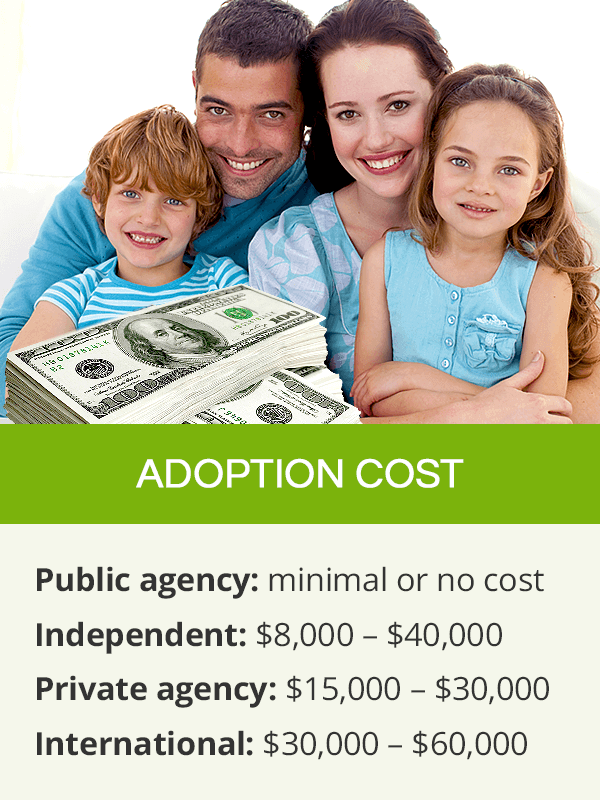
The cost to adopt a child depends on whether an agency is involved and where adoption is taking place.
- When using a domestic child welfare agency for the adoption process, there are usually few or no costs involved as there are numerous government assistance programs to encourage adoptions from foster care.
- Independent adoptions are often free as well depending on specific agreements; however, hiring an adoption attorney along with home study and other legal proceedings might cost $8,000 - $40,000.
- Adopting a child through a private agency is more expensive. Domestic adoption cost can range from $15,000 - $30,000, while international adoption cost can vary from $30,000 - $60,000 as it includes additional travel and other immigration expenses.
It is worth nothing that the federal government offers an adoption tax credit to help the adoptive families recoup the expenses they incurred.
Key Takeaways
For many couples, the initial decision to adopt a baby comes with endless questions, doubts, and uncertainties, rightly so as adoption is a big undertaking that requires intensive research and adequate time. Couples considering adopting a child have several types of adoption to choose from, depending on who they want to handle the process, where they want to adopt a baby from, and how they envision their and the child's relationship with his or her biological parents. The adoption process itself is known to be loaded with numerous requirements as the adoptive parents have to go through the home study, during which they are screened to determine if they are physically, emotionally, and financially fit to adopt a baby. Nevertheless, most couples who have gone through adopting a child agree that it is one of the most beautiful and rewarding experiences of their lives.
Sources
- Child Welfare Information Gateway. (2013). Working With Birth and Adoptive Families to Support Open Adoption. Retrieved April 4, 2019 from https://www.childwelfare.gov/pubPDFs/f_openadoptbulletin.pdf
- Child Welfare Information Gateway. (2015). Adoption Options. Where do I Start? Retrieved April 4, 2019 from https://www.childwelfare.gov/pubPDFs/f_adoptoption.pdf#page=2&view=Step%201:%20Explore%20adoption%20options
- How to Adopt.org. (n.d.). Adoption Guide. Retrieved April 4, 2019 from http://www.howtoadopt.org/adoption-guide/
- Paediatrics Child Health. (2001). Understanding adoption: A developmental approach. Retrieved April 4, 2019 from https://www.ncbi.nlm.nih.gov/pmc/articles/PMC2804559/
- The Adoption Exchange. (n.d.). The Adoption Process. Retrieved April 4, 2019 from https://www.adoptex.org/the-adoption-journey/adoption-basics/the-adoption-process/
- US Department of Health and Human Services. (2016). Planning for Adoption: Knowing the Costs and Resources. Retrieved April 4, 2019 from https://www.childwelfare.gov/pubpdfs/s_costs.pdf
Footnotes:
- SAFY. (n.d.). National Adoption Awareness Month: More Children Need Loving Families. Retrieved August 18, 2022 from https://www.safy.org/national-adoption-awareness-month-more-children-need-loving-families/
